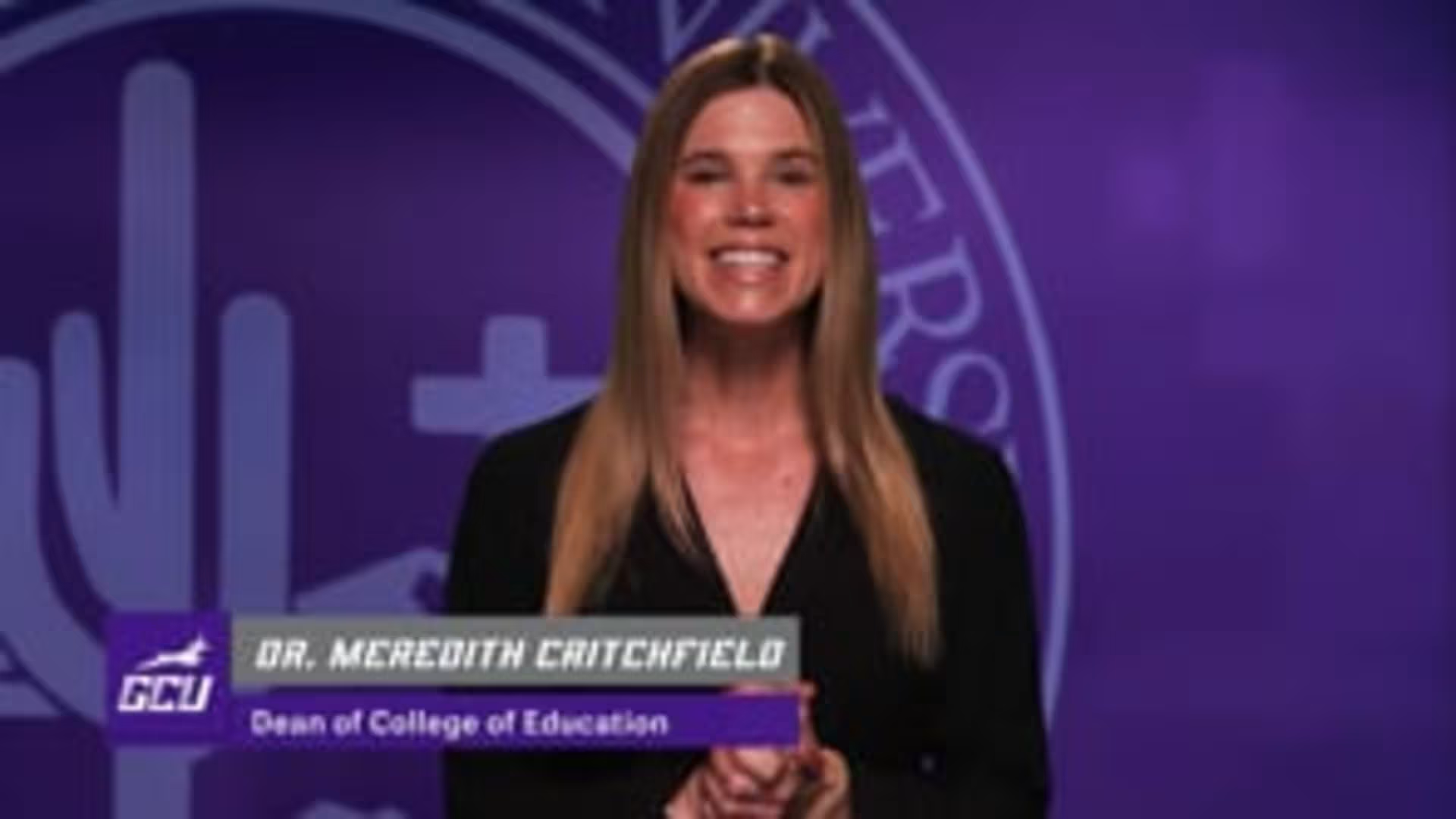
Master’s in Early Childhood Education Online
Empower Young Learners as an Educator

If you are passionate about working with children, this Master of Education (MEd) in Early Childhood Education (ECE) degree can provide you with valuable concepts and techniques for educating learners from birth through third grade. Offered by the College of Education, this degree program is also ideal for professionals looking to transition into the education field.
Early childhood educators can provide children with the right foundation for personal and academic growth. A child’s early years play a significant role in their ability to thrive later in life. Those who receive quality early childhood education are more likely to give back to society, enjoy better health, earn higher wages and raise resilient families as adults.(See disclaimer 1 )As a future educator, you could help create positive change for early learners.
Up to 12 credits or 1/3 of the total program requirements in transfer (whichever is less)
Credits: Fill out the Lopes Eval to find out what will transfer
Admission Requirements (Master's)
- Undergraduate Degree*
- 2.8+ GPA
OR 2.5+ Unweighted GPA and
- GMAT: 500
- GRE: 300 combined**
Admission requirements may differ based on degree level, program and modality, or transfer status. Some programs of study may require a higher GPA and/or other qualifying criteria for admission. Please review full admission and program requirements in the University Policy Handbook.
* Degree must be from an accredited college or program that has been approved by GCU.
** Combined verbal/quantitative, after August 2011 (1,000 combined verbal and quantitative, prior to August 2011).
Benefits of an MEd in Early Childhood Education
Young learners have particular socioemotional, cognitive and developmental needs. In this master’s in early childhood education degree program, you will closely examine how young children grow and develop so that you can best support them by creating a nurturing learning environment in which they can flourish.
Working professionals have the ability to attend classes online(See disclaimer 2) for greater flexibility. Those pursuing their degree via our online modality will be required to complete their practicum/field experiences in person.
The required practicum/field experiences throughout the program teach applied techniques. Additionally, you will need to complete a six-week practicum course in a birth through Pre-K setting and a 15-week experience in a kindergarten through third grade setting.
Master’s Degree in Early Childhood Education Coursework

Throughout our program, you will survey current ECE teaching practices and explore how those ideas and methods support the education of students from birth through third grade. You will take a deep dive into the instructional methodologies that are effective for young learners, as well as literacy intervention, instructional planning and learning environment management.
The coursework taught throughout this master’s in early childhood education online(See disclaimer 2) program can help prepare you with an understanding of typical and atypical child development, social and emotional growth and academic achievement in young learners.
Topics of study in this degree program include:
Instruction for early learners
Using technology for assessment and evaluation
Differentiation strategies for exceptional learners
Structured English immersion (SEI)
Phonics development and the science of reading
Curriculum development and lesson planning
Teaching methods across all content areas
Licensure vs. Non-Licensure
This master’s degree in early childhood education is designed to lead to initial teacher licensure. If you already hold your teaching license in another content area, consider enrolling in the non-licensure version of this program, unless licensure is necessary for your desired role. Other candidates may be interested in this non-licensure program if they do not need a license for specific positions in daycares, private schools or preschools. This will depend on the specific requirements of the facility.

Career Opportunities for MEd Graduates
Equipped with a degree that focuses on ECE, you may be prepared to pursue a career devoted to supporting and enriching the lives of the youngest learners under your care. From daycare centers to elementary schools, graduates with this master’s degree may find work in numerous education environments where they can lead the learning experiences of children from infancy to eight years old.(See disclaimer 3,4)
After graduating, you may pursue a career as a:
Preschool teacher
Kindergarten teacher
Elementary school teacher
Teaching assistant
Median annual wage for kindergarten and elementary school teachers as of May 2024(See disclaimer 5)
Number of new openings for kindergarten and elementary school teachers projected each year from 2024 to 2034(See disclaimer 6)
Earn Your Graduate Degree at an Accredited University
This master’s degree in early childhood education has been programmatically accredited by the Association for Advancing Quality in Educator Preparation (AAQEP), ensuring quality and a commitment to professional growth. Institutionally accredited by the Higher Learning Commission since 1968, GCU offers a quality education for future educators. Join a supportive community dedicated to helping you reach your educational and career goals.
Frequently Asked Questions
There is a lot to consider when choosing to pursue an advanced degree. Explore a few of the most frequently asked questions to help you make an informed decision.
What is the average salary of early childhood education MEd degree graduates?
Is a master’s in early childhood education worth it?
Can I get a master’s in early childhood education online?
How hard is a master’s degree in early childhood education?
Program Curriculum
Core Courses

Our MEd in Early Childhood Education provides the tools to create engaging learning experiences. Take the first step toward your degree today.
If you are seeking licensure/certification, please refer to the "Accreditation and Compliance/State Disclosures” link for the specific program of interest’s website for your location and/or employment state’s licensure requirements, per 34 CFR 668.14(b)32 and 668.43(c).
- First Five Years Fund. (n.d.). Why It Matters. Retrieved October 2025.
Excluding observational and practice-based experiences and student teaching.
- U.S. Bureau of Labor Statistics. (2025, Aug. 28). Preschool Teachers: Work Environment. Occupational Outlook Handbook. Retrieved October 2025.
- U.S. Bureau of Labor Statistics. (2025, Aug. 28). Kindergarten and Elementary School Teachers: Work Environment. Occupational Outlook Handbook. Retrieved October 2025.
- The earnings referenced were reported by the U.S. Bureau of Labor Statistics (BLS), Kindergarten and Elementary School Teachers as of May 2024, retrieved October 2025. Due to COVID-19, data from 2020 to 2023 may be atypical compared to prior years. BLS calculates the median using salaries of workers nationwide with varying levels of education and experience. It does not reflect the earnings of GCU graduates as kindergarten and elementary school teachers, nor does it reflect the earnings of workers in one city or region of the country or a typical entry-level salary. Median income is the statistical midpoint for the range of salaries in a specific occupation. It is very unlikely that a median salary will reflect an entry-level salary. It represents what you would earn if you were paid more money than half the workers in an occupation, and less than half the workers in an occupation. It may give you a basis to estimate what you might earn at some point if you enter this career. Grand Canyon University can make no guarantees on individual graduates’ salaries. Your employability will be determined by numerous factors over which GCU has no control, such as the employer the graduate chooses to apply to, the graduate’s experience level, individual characteristics, skills, etc. against a pool of candidates.
- COVID-19 has adversely affected the global economy and data from 2020 to 2023 may be atypical compared to prior years. Accordingly, data shown is effective August 2025, which can be found here: U.S. Bureau of Labor Statistics, Occupational Outlook Handbook, Kindergarten and Elementary School Teachers, retrieved October 2025.
- U.S. Bureau of Labor Statistics (n.d.). Should I Get a Master’s Degree? Career Outlook. Retrieved October 2025.


